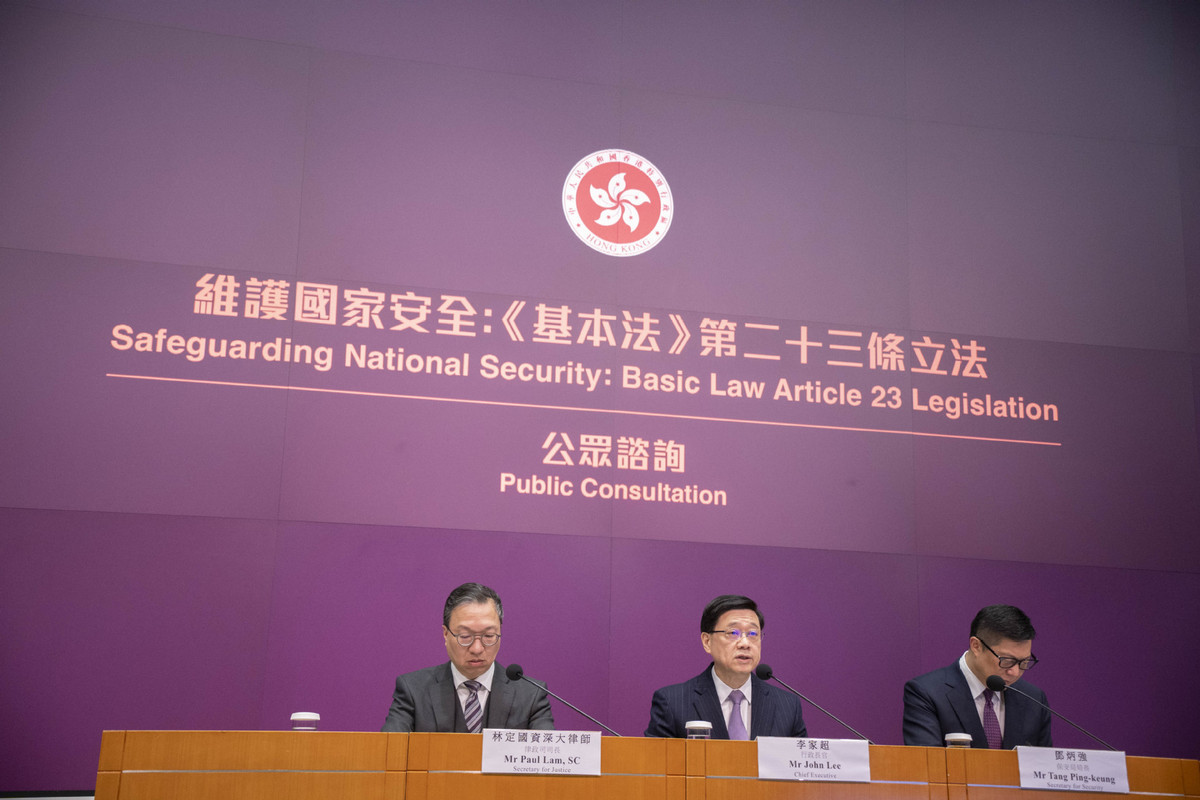New security law will help consolidate HK's development
By Liang Haiming | China Daily | Updated: 2024-02-29 08:13

The Hong Kong Special Administrative Region government initiated a one-month public consultation on Article 23 of the Basic Law on Jan 30, proposing to enact a new "national security law" based on Article 23 which will cover five major offenses. This has prompted some foreign media and politicians to claim that any Article 23-based legislation will deal a serious blow to Hong Kong's economy and undermine its status as an international financial center.
However, from an economic and financial perspective, the positive impact of an Article 23-based legislation may outweigh the negative effects. National security is of paramount importance to a country, and closely related to its economic development. From the perspective of the theories of division of labor, labor theory of value, free market philosophy and gross domestic product, it is evident that a Hong Kong-enacted new "national security law" is necessary for both the Chinese mainland and the SAR.
National security is a public good
Seen from the view of the public goods theory, national security can be considered a public good. For instance, by using the Article 23-based legislation, the mainland and Hong Kong can better protect national security and ensure the socioeconomic stability of the region.
Viewed through the lens of externalities theory, maintaining national security has positive effects on the entire economic system. Foolproof national security can attract foreign investors and businesses, provide a stable business environment and promote economic growth. It can also reduce crimes, minimize the threat of terrorism, and increase investors' confidence, thereby promoting business activities and investment.
Legislation on national security can boost the confidence of businesses and individuals on the mainland as well as in Hong Kong. An Article 23-based national security law can also provide a stable legal and institutional environment, protecting the rights of businesses and individuals, thus promoting investment and innovation.
National security is an important factor in maintaining social stability and vital to promoting economic development. Through the Article 23-based legislation, the mainland and Hong Kong can prevent and address internal and external threats and conflicts, maintaining social stability and promoting sustained economic growth.
Proposed legislation can help boost development
An Article 23-based legislation will help better safeguard national security, which is necessary for boosting economic development and laying a solid foundation for the continued development of the mainland and the SAR, as well as maintaining Hong Kong's status as a global financial center.
First, the proposed legislation would serve as a risk management tool, which is necessary because the financial market is highly sensitive to the security situation. The threats of political instability, terrorism and war can lead to market fluctuations and cause panic among investors. The proposed law can minimize, if not altogether prevent, such risks, provide a stable legal system and reduce uncertainties while stabilizing the financial market.
Second, such legislation can boost global investors' confidence in Hong Kong's market. On the other hand, lack of security guarantee could reduce global investors' confidence, resulting in decreased investment and capital outflow.
Third, a new national security law could promote global financial cooperation and exchanges. In the current globalized economic environment, national security of countries is closely interconnected. As such, through an Article 23-based legislation, the mainland and the SAR can deepen cooperation with other economies, collectively address transnational security threats and help establish a more stable and secure global financial system. Such cooperation in turn could promote cross-border investment, trade and financial flow.
And fourth, such legislation would contribute to financial stability. An Article 23-based law can minimize the security threats to the financial system and maintain the stability of the financial market, while safeguarding the interests of financial institutions and investors. The implementation of such legislation will help build a stable and sustainable financial environment, and promote the development of both the mainland and Hong Kong.
To be sure, Hong Kong's economic development will be influenced by other factors, too, such as the international political environment, the global economic situation and market demand.
Some foreign investors, however, are still concerned about the impact of a new national security law and have adopted a wait-and-watch attitude toward the proposed national security law, which may affect their investment decisions.
Nevertheless, the SAR government is expected to adopt a transparent, fair and predictable approach in terms of implementing the proposed national security law, and continue to cooperate with foreign investors in order to enhance mutual trust and provide a favorable investment environment for them.
The purpose of enacting an Article 23-based security law is to enable Hong Kong to fulfill its constitutional duty to safeguard the country's sovereignty and national security. And there is no doubt that eliminating national security risks will have a positive effect on Hong Kong's long-term development and boost investor confidence.
From an economic perspective, the proposed legislation will help maintain social stability and a secure environment in Hong Kong, and reduce social unrest and violent activities, which are crucial to economic development, attracting and retaining investors, and promoting business activities and cross-border trade.
Rule of law will facilitate stable development
Further, such legislation will strengthen the rule of law in Hong Kong, improve the region's legal environment and promote domestic and international capital flow. It will also promote economic diversification, facilitate the stable development of key industries such as finance and commerce, and attract more investments.
More importantly, the proposed law will enhance economic cooperation and ties between the mainland, with its vast market and development opportunities, and Hong Kong. And leveraging its unique geographical position and advantages, Hong Kong can serve as a bridge between the mainland and the global economy, and promote global cooperation in trade, investment and finance.
On the financial front, such legislation will consolidate Hong Kong's status as an international financial center and help maintain the region's financial stability, which is necessary to attracting domestic and foreign investors and maintaining the normal operation of the financial market.
The proposed law can also drive financial innovation and technological development, which are necessary for maintaining Hong Kong's competitiveness in the international market. The proposed legislation will create a more stable and secure environment for financial technology innovation, helping the SAR to attract more financial technology companies and entrepreneurs to the region. This will promote the transformation and upgrading of Hong Kong's financial industry, and increase the added value of the financial industry.
The proposed law will also facilitate the further integration of Hong Kong's financial sector with the mainland's financial market, and build a stable legal and policy environment and facilitate the flow of funds, talents and technologies between the two sides.
While the proposed legislation may have positive impacts on the economy of Hong Kong, it is important to recognize that Hong Kong's future economic development will be influenced by other factors, too, including the international political environment, global economic situation and market demand.
In short, despite external factors impacting Hong Kong's economic development, a new national security law will only have a positive effect on the region's long-term development and investor confidence, achieving win-win results.
The author is chairman of the China Silk Road iValley Research Institute. The views don't necessarily reflect those of China Daily.
If you have a specific expertise, or would like to share your thought about our stories, then send us your writings at opinion@chinadaily.com.cn, and comment@chinadaily.com.cn.
























